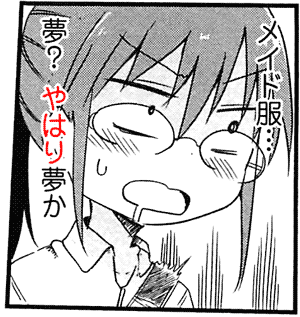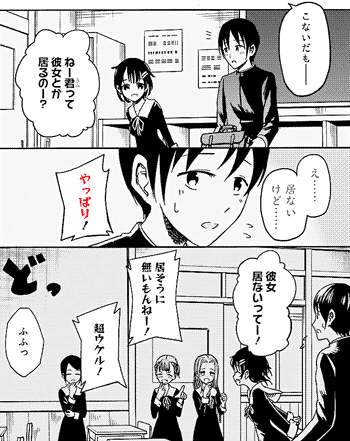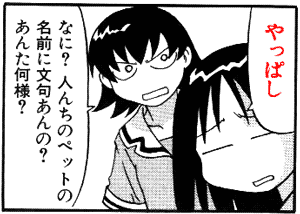It's also spelled yahari やはり, without kanji, and yahari 矢張, without okurigana. Variants include yappari やっぱり, yappa やっぱ, and yappashi やっぱし.
Manga: Kobayashi-san Chi no Meidoragon 小林さんちのメイドラゴン (Chapter 2, トールと出会い)
Translation
The word yahari やはり translates to "as I thought," "as I assumed," "as I expected," "just like I thought," "just like I heard," and so on, but that's not what it means literally.That is, there's no word that means "I" in yahari. It's only translated like that because of how it's used.
Usage
Syntactically, yahari is an adverb, and it can be used in three similar, but different ways.As I thought
First, when you imagine something would be true, and it ends up being true, just like you expected, or thought, or heard.- yahari sou deshita ka
やはりそうでしたか
As I thought, it was that way. - yahari sou datta
やはりそうだった
(same meaning.) - yahari ore no seishun rabukome wa machigatteiruやはり俺の青春ラブコメはまちがっている。
As I thought, my young love comedy is wrong.
Manga: Kobayashi-san Chi no Meidoragon 小林さんちのメイドラゴン (Chapter 2, トールと出会い)
- Context: Kobayashi 小林 sees a dragon girl in maid clothes.
- meido fuku...
メイド服・・・
Maid clothes... - yume? yahari yume ka?
夢?やはり夢か?
Is it a dream? As I thought, is it a dream?
As Expected
A second way yahari can be used is when two things are the same, and there was an expectation that one thing was going to be the same as the other, so one thing ends up being, as expected, the same as the other.For example, if someone's grandfather is a teacher, their father is a teacher, their mother is a teacher, then their bother is:
- ani mo yahari kyoushi wo shite-iru
兄もやはり教師をしている
The older brother, too, as expected, works as a teacher.
Unchanged
A third way yahari can be used is to say that something is the same as it was previously. In particular, when talking about decisions.For example, if someone says they're going somewhere tomorrow, and you would rather them not go. Next day you say them getting ready to go, and you say:
- yahari iku-n-desu ka?
やはり行くんですか?
Are you still going to go?- You haven't changed your mind about it?
Similarly, yahari can be used if you had decided to do something, but then, after reconsidering it, you ended up deciding that your starting decision was the right decision after all. In other words, your decision remained unchanged after consideration.
- iroiro kangaeta kedo, yahari kareshi to wakaretai
色々考えたけど、やはり彼氏と別れたい
[I] thought about it a lot but, in the end [I] still want to break with [my] boyfriend.- iroiro 色々
Various. In various ways. In a lot of ways.
- iroiro 色々
If you start with an assumption that something is the best, but end up trying out various different things, you can go back to what you started with and say:
- yahari kore ga ichiban da
やはりこれが一番だ
As I thought, this is the best.- Even after trying out various things, my opinion remained unchanged.
If something is true under certain circumstances, and the circumstances changes, then, if that thing remains unchanged:
- yahari tensai demo kodomo wa kodomo da
やはり天才でも子供は子供だ
Even a genius, a child is still a child.- For example, when you have a character that's a prodigy genius child that astounds everybody with their adult-level intelligence, but, in the end, children are still children.
Kanji
The kanji of yahari やはり is ya 矢, "arrow," and hari 張り, "stretch. That's the kanji for yappari 矢っ張り as well.It's impossible to guess the meaning of the words from its kanji: "arrow" and "stretch" have nothing to do with "as I thought." That's because the kanji spelling of yahari is an ateji 当て字.
They kanji were selected not because their meanings matched the word, but only because the readings matched it. So ya 矢, "arrow," was used to write the word just because yahari starts with ya や, not because it has anything to do with arrows.
やっぱり
The word yappari やっぱり means the same thing as yahari やはり. It just has a hard pa ぱ instead of a ha は.Although that makes no sense in the English alphabet, note that ha は and pa ぱ are basically the same character in the Japanese alphabet, The only difference is the handakuten 半濁点 diacritic.
The addition of the double consonant, represented by the small tsu っ, is because syllables starting with h turn to p when suffixed, a change in pronunciation called sokuonbin 促音便. The same thing happens with nihon and nippon.
- nihon 日本(にほん)
nippon 日本(にっぽん)
Japan.
Just like that, the meaning of yahari and yappari is pretty much the same.
Manga: Kaguya-sama wa Kokurasetai ~Tensai-Tachi no Ren'ai Zunousen かぐや様は告らせたい~天才たちの恋愛頭脳戦~ (Chapter 6, 白銀御行は隠したい)
- Context: a guy remembers his dark past.
- konaida mo----
こないだもーー
The other day, too... - nee, kimi tte
kanojo toka iru noo?
ねー君って彼女とかいるのー?
Hey, do you have a girlfriend or something like that?- The tte って here is a topic marker, not a quotative marker.
- e...... inai kedo......
え・・・・・・ 居ないけど?
Eh...... [I] don't, but [why are you asking?]...... - yappari!
やっぱり!
[Just as I thought]! - kanojo inai tte~~!
彼女居ないってー!
[He said] [he] doesn't have a girlfriend! - isou ni nai mon ne~~!
居そうに無いもんねー
[He] doesn't seem like [he] would have [one], right~~- Here, a second girl says the guy doesn't looks like he would have a girlfriend. She's judging him by his appearances.
- mon もん
(nominalizer.) - ne ね
Right?
- chou ukeru!
超ウケル!
[That's] super funny!- ukeru 受ける
To receive. (literally.)
To find funny. (slang.)
- ukeru 受ける
- fufu'
ふふっ
*giggle*
やっぱ
The word yappa やっぱ is just a variant of yappari やっぱり with ri り cut short.やっぱし
The word yappashi やっぱし is another variant of yappari やっぱり.
Manga: Azumanga Daioh あずまんが大王 (Volume 1, Chapter 6, June, Page 48, 命名)
- Context: Ayumu is a transfer student. She came from Osaka. Tomo nicknamed her Osaka, literally, because she came from Osaka. Ayumu asks Tomo if she ever had a pet, and what was the pet called. Tomo answered she had a hamster, whom she named Hamu-chan.
- yappashi
やっぱし
[Just as I thought].- Her naming sense is too simplistic!
- nani?
なに?
What? - hito'n-chi no petto no namae ni monku an'no?
人んちのペットの名前に文句あんの?
Do [you] have a complain [about] the name of [other] people's pets? - anta nani-sama?
あんた何様?
[Who do you think you are]?
References
- やはり - dictionary.goo.ne.jp, accessed 2019-09-24.



No comments: